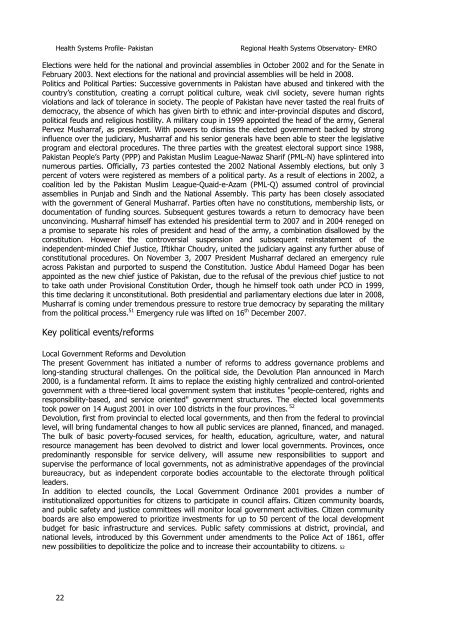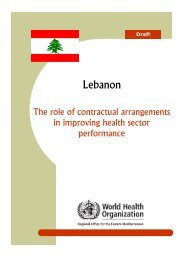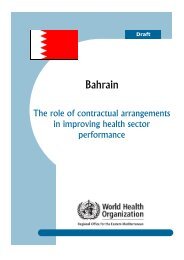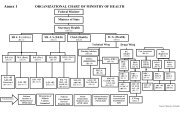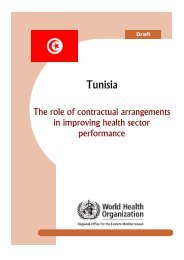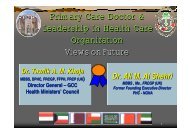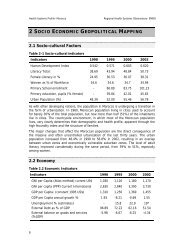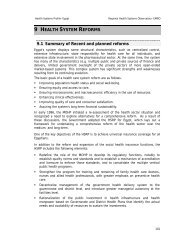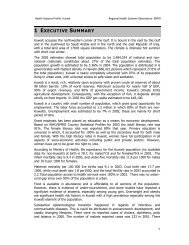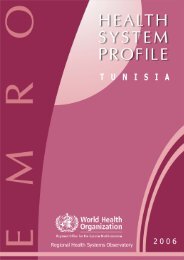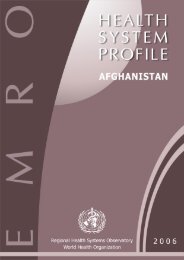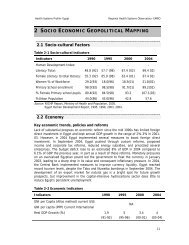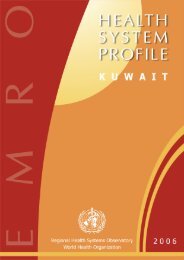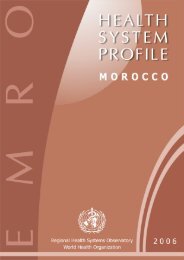Pakistan : Complete Profile - What is GIS - World Health Organization
Pakistan : Complete Profile - What is GIS - World Health Organization
Pakistan : Complete Profile - What is GIS - World Health Organization
You also want an ePaper? Increase the reach of your titles
YUMPU automatically turns print PDFs into web optimized ePapers that Google loves.
<strong>Health</strong> Systems <strong>Profile</strong>- <strong>Pak<strong>is</strong>tan</strong> Regional <strong>Health</strong> Systems Observatory- EMRO<br />
Elections were held for the national and provincial assemblies in October 2002 and for the Senate in<br />
February 2003. Next elections for the national and provincial assemblies will be held in 2008.<br />
Politics and Political Parties: Successive governments in <strong>Pak<strong>is</strong>tan</strong> have abused and tinkered with the<br />
country’s constitution, creating a corrupt political culture, weak civil society, severe human rights<br />
violations and lack of tolerance in society. The people of <strong>Pak<strong>is</strong>tan</strong> have never tasted the real fruits of<br />
democracy, the absence of which has given birth to ethnic and inter-provincial d<strong>is</strong>putes and d<strong>is</strong>cord,<br />
political feuds and religious hostility. A military coup in 1999 appointed the head of the army, General<br />
Pervez Musharraf, as president. With powers to d<strong>is</strong>m<strong>is</strong>s the elected government backed by strong<br />
influence over the judiciary, Musharraf and h<strong>is</strong> senior generals have been able to steer the leg<strong>is</strong>lative<br />
program and electoral procedures. The three parties with the greatest electoral support since 1988,<br />
<strong>Pak<strong>is</strong>tan</strong> People’s Party (PPP) and <strong>Pak<strong>is</strong>tan</strong> Muslim League-Nawaz Sharif (PML-N) have splintered into<br />
numerous parties. Officially, 73 parties contested the 2002 National Assembly elections, but only 3<br />
percent of voters were reg<strong>is</strong>tered as members of a political party. As a result of elections in 2002, a<br />
coalition led by the <strong>Pak<strong>is</strong>tan</strong> Muslim League-Quaid-e-Azam (PML-Q) assumed control of provincial<br />
assemblies in Punjab and Sindh and the National Assembly. Th<strong>is</strong> party has been closely associated<br />
with the government of General Musharraf. Parties often have no constitutions, membership l<strong>is</strong>ts, or<br />
documentation of funding sources. Subsequent gestures towards a return to democracy have been<br />
unconvincing. Musharraf himself has extended h<strong>is</strong> presidential term to 2007 and in 2004 reneged on<br />
a prom<strong>is</strong>e to separate h<strong>is</strong> roles of president and head of the army, a combination d<strong>is</strong>allowed by the<br />
constitution. However the controversial suspension and subsequent reinstatement of the<br />
independent-minded Chief Justice, Iftikhar Choudry, united the judiciary against any further abuse of<br />
constitutional procedures. On November 3, 2007 President Musharraf declared an emergency rule<br />
across <strong>Pak<strong>is</strong>tan</strong> and purported to suspend the Constitution. Justice Abdul Hameed Dogar has been<br />
appointed as the new chief justice of <strong>Pak<strong>is</strong>tan</strong>, due to the refusal of the previous chief justice to not<br />
to take oath under Prov<strong>is</strong>ional Constitution Order, though he himself took oath under PCO in 1999,<br />
th<strong>is</strong> time declaring it unconstitutional. Both presidential and parliamentary elections due later in 2008,<br />
Musharraf <strong>is</strong> coming under tremendous pressure to restore true democracy by separating the military<br />
from the political process. 51 Emergency rule was lifted on 16 th December 2007.<br />
Key political events/reforms<br />
Local Government Reforms and Devolution<br />
The present Government has initiated a number of reforms to address governance problems and<br />
long-standing structural challenges. On the political side, the Devolution Plan announced in March<br />
2000, <strong>is</strong> a fundamental reform. It aims to replace the ex<strong>is</strong>ting highly centralized and control-oriented<br />
government with a three-tiered local government system that institutes "people-centered, rights and<br />
responsibility-based, and service oriented" government structures. The elected local governments<br />
took power on 14 August 2001 in over 100 d<strong>is</strong>tricts in the four provinces. 52<br />
Devolution, first from provincial to elected local governments, and then from the federal to provincial<br />
level, will bring fundamental changes to how all public services are planned, financed, and managed.<br />
The bulk of basic poverty-focused services, for health, education, agriculture, water, and natural<br />
resource management has been devolved to d<strong>is</strong>trict and lower local governments. Provinces, once<br />
predominantly responsible for service delivery, will assume new responsibilities to support and<br />
superv<strong>is</strong>e the performance of local governments, not as admin<strong>is</strong>trative appendages of the provincial<br />
bureaucracy, but as independent corporate bodies accountable to the electorate through political<br />
leaders.<br />
In addition to elected councils, the Local Government Ordinance 2001 provides a number of<br />
institutionalized opportunities for citizens to participate in council affairs. Citizen community boards,<br />
and public safety and justice committees will monitor local government activities. Citizen community<br />
boards are also empowered to prioritize investments for up to 50 percent of the local development<br />
budget for basic infrastructure and services. Public safety comm<strong>is</strong>sions at d<strong>is</strong>trict, provincial, and<br />
national levels, introduced by th<strong>is</strong> Government under amendments to the Police Act of 1861, offer<br />
new possibilities to depoliticize the police and to increase their accountability to citizens. 52<br />
22


